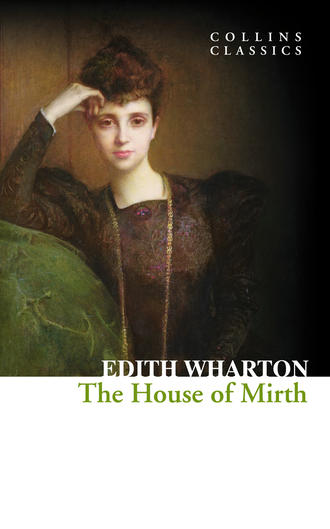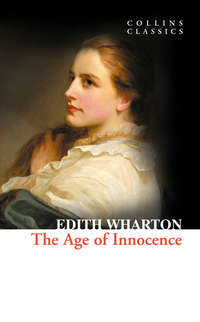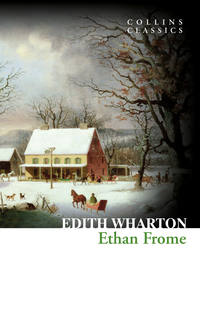
Полная версия
The House of Mirth

THE HOUSE OF MIRTH
Edith Wharton

Copyright
William Collins
An imprint of HarperCollinsPublishers
1 London Bridge Street,
London SE1 9GF
WilliamCollinsBooks.com
This eBook edition published by William Collins in 2015
Life & Times section © HarperCollinsPublishers Ltd
Gerard Cheshire asserts his moral right as author of the Life & Times section
Classic Literature: Words and Phrases adapted from
Collins English Dictionary
Cover by e-Digital Design
Cover image: Portrait of a Young Woman, c.1900 (oil on canvas), Dagnan-Bouveret, Pascal Adolphe Jean (1852–1929)/Private Collection/Archives Charmet/Bridgeman Images.
A catalogue record for this book is available from the British Library.
All rights reserved under International and Pan-American Copyright Conventions. By payment of the required fees, you have been granted the non-exclusive, non-transferable right to access and read the text of this e-book on-screen. No part of this text may be reproduced, transmitted, down-loaded, decompiled, reverse engineered, or stored in or introduced into any information storage and retrieval system, in any form or by any means, whether electronic or mechanical, now known or hereinafter invented, without the express written permission of HarperCollins.
Source ISBN: 9780008110581
Ebook Edition © May 2015 ISBN: 9780008110598
Version: 2015-04-01
History of Collins
In 1819, millworker William Collins from Glasgow, Scotland, set up a company for printing and publishing pamphlets, sermons, hymn books, and prayer books. That company was Collins and was to mark the birth of HarperCollins Publishers as we know it today. The long tradition of Collins dictionary publishing can be traced back to the first dictionary William published in 1824, Greek and English Lexicon. Indeed, from 1840 onwards, he began to produce illustrated dictionaries and even obtained a licence to print and publish the Bible.
Soon after, William published the first Collins novel, Ready Reckoner; however, it was the time of the Long Depression, where harvests were poor, prices were high, potato crops had failed, and violence was erupting in Europe. As a result, many factories across the country were forced to close down and William chose to retire in 1846, partly due to the hardships he was facing.
Aged 30, William’s son, William II, took over the business. A keen humanitarian with a warm heart and a generous spirit, William II was truly “Victorian” in his outlook. He introduced new, up-to-date steam presses and published affordable editions of Shakespeare’s works and The Pilgrim’s Progress, making them available to the masses for the first time. A new demand for educational books meant that success came with the publication of travel books, scientific books, encyclopedias, and dictionaries. This demand to be educated led to the later publication of atlases, and Collins also held the monopoly on scripture writing at the time.
In the 1860s Collins began to expand and diversify and the idea of “books for the millions” was developed. Affordable editions of classical literature were published, and in 1903 Collins introduced 10 titles in their Collins Handy Illustrated Pocket Novels. These proved so popular that a few years later this had increased to an output of 50 volumes, selling nearly half a million in their year of publication. In the same year, The Everyman’s Library was also instituted, with the idea of publishing an affordable library of the most important classical works, biographies, religious and philosophical treatments, plays, poems, travel, and adventure. This series eclipsed all competition at the time, and the introduction of paperback books in the 1950s helped to open that market and marked a high point in the industry.
HarperCollins is and has always been a champion of the classics, and the current Collins Classics series follows in this tradition – publishing classical literature that is affordable and available to all. Beautifully packaged, highly collectible, and intended to be reread and enjoyed at every opportunity.
Life & Times
Wharton and Class
Many novelists use their prose as a means of expressing their frustrations with the contradictions and hypocrisies of human behaviour, often because they themselves do not adhere particularly stringently to the rules of etiquette that exist in their society. Of course 19th century societies in Britain and the USA were prone to formalizing polite society as a way of distinguishing the haves from the have-nots. Edith Wharton was born into a privileged American family, but she was equipped with the sensibilities to notice the contrasting absurdity with which many of her class went about their lives in public and in private. Like many other novelists before her, Wharton saw that people were people wherever they happened to fit in the hierarchy of society. They were equally capable of honourable and dishonourable behaviour; it is just that the upper class tended to cover up the latter and exaggerate the former for the sake of keeping up appearances. Wharton was not vitriolic though, for her writing is imbued with humour even though it criticises between the lines. The Age of Innocence is essentially a story about vanity, pride, judgement, temptation and prejudice in the well-to-do cohort of late 19th century US society. Underpinning the tale is the double-standard.
The Age of Innocence
The Age of Innocence is fundamentally about a gentleman who is engaged to be married, but allows his affections to stray toward another woman who is separated from her husband and about to divorce. In today’s occidental society the plot would barely raise an eyebrow, but in its period it would have been viewed as an absolute scandal. Wharton published the book in 1920, some 40-odd years after the time in which the story is set, but she was 58 years old and very familiar with the subject matter as she had been born and raised in the environment she describes. Even in the first quarter of the 20th century divorce was considered something of a taboo, so the book caused quite a stir. Wharton had, herself, been in a loveless marriage for almost three decades and had experienced a nervous breakdown following her divorce in 1913, so writing The Age of Innocence must have been therapeutic as well as a vessel through which Wharton could show the world her views. The basic premise of her story was that if you belong to a society that will trap you in marriage, you better be very sure that you are marrying the right person.
In society today, the finger of judgement is no longer pointed at those who do not succeed in marriage. As a consequence, many contemporary readers have an interest in Wharton’s genre. While they see that an overly formalized society can make marriage oppressive and generate double-standards, they also see that a lack of formality leads to a society where marriage is entirely devalued.
Wharton’s masterpiece is about as personal as one can get as a writer. The central character, Newland, still goes ahead with his marriage despite his obsessive feelings for the other woman, Countess Ellen. His wife, May, is consequently destined for a life of betrothal with unrequited love. So too is he of course, such is his sense of honour in being seen to do the right thing in the eyes of the society he belongs to. Following the marriage Newland cannot desist from courting Ellen and is on the verge of leaving his wife when he discovers that May is pregnant.
Ellen emigrates to Europe and Newland remains in America to feign happiness with May for the sake of their unborn child. A full quarter of a century later, Newland travels to Europe with his son, following May’s death. He has an opportunity to meet Ellen again, but realizes that he can never restore the past, so he walks away.
From Wharton’s point of view, all three characters are tragic in their own way. May lives through a marriage without real passion; Newland is tormented and then disappointed; Ellen is exiled by her family and never reunited with Newland even though the opportunity arises. It isn’t clear where Wharton places herself necessarily. Perhaps there is something of her in all three personalities, perhaps not, but the overall theme certainly echoes her own situation. Critics were so impressed by the book that Wharton was awarded the Pulitzer Prize in 1921.
The title of the novel is supposed to be satirical, a comment from Wharton on the way polite society wished to be viewed. Wharton had, in 1905, published a forerunner to The Age of Innocence in the form of The House of Mirth. The earlier book, as its title suggests, had been far more vitriolic and mocking in its condemnations and Wharton had apparently wished to redress and make amends with the later book. By the time The Age of Innocence was published the world had witnessed the Great War (World War I) and people’s attitudes had altered. Equality and egalitarianism were taking over from elitism and etiquette. In addition, in 1919 congress bowed to the pressures of suffrage and gave US women the vote. All in all, the USA had changed markedly in the 15 years between Wharton’s two novels and it was now ready to recognize and celebrate the importance of her work.
In some respects Wharton’s theme belongs to the same stable as those addressed by Jane Austen a century earlier in England. Austen’s stories, like Wharton’s, work within a behavioural framework of etiquette which is no longer relevant. Nevertheless, the drama, romance and tragedy is consequently heightened as a result of the limiting strict societal rules.
Ethan Frome
In 1911, the year that Wharton moved to Europe after the breakdown of her marriage, her novel Ethan Frome was published. A tragic love story, it has at its centre various idiosyncrasies of human behaviour that have significant consequences for the characters in the story.
Set in New England, the eponymous Ethan Frome falls in love with his ill wife’s cousin, Mattie, whom they have employed as a carer. Yet the relationship is doomed, and tragedy ensues. The plot is intricately linked to the polite society in which they live; there are strict rules of behaviour that cannot be broken, and it is an adherence to these that informs the lovers’ actions. Ethan Frome, similarly to the work of other novelists, uses the constraints of social etiquette as a tool for manipulating both characters and plotlines.
Imposing unwritten rules of behaviour on the characters’ sense of morality allows the author to invent emotive situations to engage their readers. The turmoil of Ethan’s mind, full of infidelity, is only worth writing about in a world where such thoughts are deemed unacceptable by the society in which he lives.
Wharton lived in era that was characterized by a seismic shift in societal norms and attitudes, in part due to the turn of the century and the advent of world conflict that it brought. The new world that emerged began slowly to feel more egalitarian, so socially divisive and restrictive rules of etiquette were increasingly disregarded.
The House of Mirth
In The House of Mirth, published in 1905, we see Wharton deliver another scathing blow to the American upper classes, the social milieu to which she belonged. It proved to be a popular novel, though divided opinion.
Conflicted between marrying for love and marrying for money, the central character, Lily Bart, reveals the precarious nature of the foundations on which the class system – and Lily’s own values – was based. During the course of the novel she makes a series of uncertain moves and tardy decisions that allow her intentions to be misinterpreted by others. The story can be perceived as a comedy of errors, as Wharton highlights the fragility of maintaining one’s respectability in a rarefied environment – after several ill-advised choices, one’s precious social status can be lost for ever.
On publication the New York Times claimed that it was ‘a novel of remarkable power’ and that ‘its descriptive passages have verity and charm, it has the saving grace of humor, its multitude of personages … all have the semblance of life’. Opinions differed, with many readers defending New York’s social elite whom the book criticised at its heart.
Despite this, one of Wharton’s greatest skills was her creation of believable characters and their behaviour and interactions with each other; even though the intricacies of the plot may be fundamentally unrealistic, the reader believes in Lily’s circumstances, actions, and ensuing loss of control.
The novel’s title comes from a line in the Bible, Ecclesiastes 7:4: ‘The heart of the wise is in the house of mourning; but the heart of fools is in the house of mirth.’ Using this reference, Wharton offers the reader a comment on the dichotomy between money and morality, frivolity and gravity.
Contents
Cover
Title Page
Copyright
History of Collins
Life & Times
Book One
Chapter 1
Chapter 2
Chapter 3
Chapter 4
Chapter 5
Chapter 6
Chapter 7
Chapter 8
Chapter 9
Chapter 10
Chapter 11
Chapter 12
Chapter 13
Chapter 14
Chapter 15
Book Two
Chapter 1
Chapter 2
Chapter 3
Chapter 4
Chapter 5
Chapter 6
Chapter 7
Chapter 8
Chapter 9
Chapter 10
Chapter 11
Chapter 12
Chapter 13
Chapter 14
Classic Literature: Words and Phrases
About the Publisher
CHAPTER 1
Selden paused in surprise. In the afternoon rush of the Grand Central Station his eyes had been refreshed by the sight of Miss Lily Bart.
It was a Monday in early September, and he was returning to his work from a hurried dip into the country; but what was Miss Bart doing in town at that season? If she had appeared to be catching a train, he might have inferred that he had come on her in the act of transition between one and another of the country-houses which disputed her presence after the close of the Newport season; but her desultory air perplexed him. She stood apart from the crowd, letting it drift by her to the platform or the street, and wearing an air of irresolution which might, as he surmised, be the mask of a very definite purpose. It struck him at once that she was waiting for someone, but he hardly knew why the idea arrested him. There was nothing new about Lily Bart, yet he could never see her without a faint movement of interest: it was characteristic of her that she always roused speculation, that her simplest acts seemed the result of far-reaching intentions.
An impulse of curiosity made him turn out of his direct line to the door, and stroll past her. He knew that if she did not wish to be seen she would contrive to elude him; and it amused him to think of putting her skill to the test.
“Mr. Selden—what good luck!”
She came forward smiling, eager almost, in her resolve to intercept him. One or two persons, in brushing past them, lingered to look; for Miss Bart was a figure to arrest even the suburban traveller rushing to his last train.
Selden had never seen her more radiant. Her vivid head, relieved against the dull tints of the crowd, made her more conspicuous than in a ballroom, and under her dark hat and veil she regained the girlish smoothness, the purity of tint, that she was beginning to lose after eleven years of late hours and indefatigable dancing. Was it really eleven years, Selden found himself wondering, and had she indeed reached the nine-and-twentieth birthday with which her rivals credited her?
“What luck!” she repeated. “How nice of you to come to my rescue!”
He responded joyfully that to do so was his mission in life, and asked what form the rescue was to take.
“Oh, almost any—even to sitting on a bench and talking to me. One sits out a cotillion—why not sit out a train? It isn’t a bit hotter here than in Mrs. Van Osburgh’s conservatory—and some of the women are not a bit uglier.” She broke off, laughing, to explain that she had come up to town from Tuxedo, on her way to the Gus Trenors’ at Bellomont, and had missed the three-fifteen train to Rhinebeck. “And there isn’t another till half-past five.” She consulted the little jewelled watch among her laces. “Just two hours to wait. And I don’t know what to do with myself. My maid came up this morning to do some shopping for me, and was to go on to Bellomont at one o’clock, and my aunt’s house is closed, and I don’t know a soul in town.” She glanced plaintively about the station. “It is hotter than Mrs. Van Osburgh’s, after all. If you can spare the time, do take me somewhere for a breath of air.”
He declared himself entirely at her disposal: the adventure struck him as diverting. As a spectator, he had always enjoyed Lily Bart; and his course lay so far out of her orbit that it amused him to be drawn for a moment into the sudden intimacy which her proposal implied.
“Shall we go over to Sherry’s for a cup of tea?”
She smiled assentingly, and then made a slight grimace.
“So many people come up to town on a Monday—one is sure to meet a lot of bores. I’m as old as the hills, of course, and it ought not to make any difference; but if I’m old enough, you’re not,” she objected gaily. “I’m dying for tea—but isn’t there a quieter place?”
He answered her smile, which rested on him vividly. Her discretions interested him almost as much as her imprudences: he was so sure that both were part of the same carefully-elaborated plan. In judging Miss Bart, he had always made use of the “argument from design”.
“The resources of New York are rather meagre,” he said; “but I’ll find a hansom first, and then we’ll invent something.” He led her through the throng of returning holiday-makers, past sallow-faced girls in preposterous hats, and flat-chested women struggling with paper bundles and palm-leaf fans. Was it possible that she belonged to the same race? The dinginess, the crudity of this average section of womanhood made him feel how highly specialized she was.
A rapid shower had cooled the air, and clouds still hung refreshingly over the moist street.
“How delicious! Let us walk a little,” she said as they emerged from the station.
They turned into Madison Avenue and began to stroll northward. As she moved beside him, with her long light step, Selden was conscious of taking a luxurious pleasure in her nearness: in the modelling of her little ear, the crisp upward wave of her hair—was it ever so slightly brightened by art?—and the thick planting of her straight black lashes. Everything about her was at once vigorous and exquisite, at once strong and fine. He had a confused sense that she must have cost a great deal to make, that a great many dull and ugly people must, in some mysterious way, have been sacrificed to produce her. He was aware that the qualities distinguishing her from the herd of her sex were chiefly external: as though a fine glaze of beauty and fastidiousness had been applied to vulgar clay. Yet the analogy left him unsatisfied, for a coarse texture will not take a high finish; and was it not possible that the material was fine, but that circumstance had fashioned it into a futile shape?
As he reached this point in his speculations the sun came out, and her lifted parasol cut off his enjoyment. A moment or two later she paused with a sigh.
“Oh, dear, I’m so hot and thirsty—and what a hideous place New York is!” She looked despairingly up and down the dreary thoroughfare. “Other cities put on their best clothes in summer, but New York seems to sit in its shirtsleeves.” Her eyes wandered down one of the side-streets. “Someone has had the humanity to plant a few trees over there. Let us go into the shade.”
“I am glad my street meets with your approval,” said Selden as they turned the corner.
“Your street? Do you live here?”
She glanced with interest along the new brick and limestone house-fronts, fantastically varied in obedience to the American craving for novelty, but fresh and inviting with their awnings and flower-boxes.
“Ah, yes—to be sure: The Benedick. What a nice-looking building! I don’t think I’ve ever seen it before.” She looked across at the flat-house with its marble porch and pseudo-Georgian facade. “Which are your windows? Those with the awnings down?”
“On the top floor—yes.”
“And that nice little balcony is yours? How cool it looks up there!”
He paused a moment. “Come up and see,” he suggested. “I can give you a cup of tea in no time—and you won’t meet any bores.”
Her colour deepened—she still had the art of blushing at the right time—but she took the suggestion as lightly as it was made.
“Why not? It’s too tempting—I’ll take the risk,” she declared.
“Oh, I’m not dangerous,” he said in the same key. In truth, he had never liked her as well as at that moment. He knew she had accepted without afterthought: he could never be a factor in her calculations, and there was a surprise, a refreshment almost, in the spontaneity of her consent.
On the threshold he paused a moment, feeling for his latchkey.
“There’s no one here; but I have a servant who is supposed to come in the mornings, and it’s just possible he may have put out the tea-things and provided some cake.”
He ushered her into a slip of a hall hung with old prints. She noticed the letters and notes heaped on the table among his gloves and sticks; then she found herself in a small library, dark but cheerful, with its walls of books, a pleasantly faded Turkey rug, a littered desk and, as he had foretold, a tea-tray on a low table near the window. A breeze had sprung up, swaying inward the muslin curtains, and bringing a fresh scent of mignonette and petunias from the flower-box on the balcony.
Lily sank with a sigh into one of the shabby leather chairs.
“How delicious to have a place like this all to one’s self! What a miserable thing it is to be a woman.” She leaned back in a luxury of discontent.
Selden was rummaging in a cupboard for the cake.
“Even women,” he said, “have been known to enjoy the privileges of a flat.”
“Oh, governesses—or widows. But not girls—not poor, miserable, marriageable girls!”
“I even know a girl who lives in a flat.”
She sat up in surprise. “You do?”
“I do,” he assured her, emerging from the cupboard with the sought-for cake.
“Oh, I know—you mean Gerty Farish.” She smiled a little unkindly. “But I said marriageable—and besides, she has a horrid little place, and no maid, and such queer things to eat. Her cook does the washing and the food tastes of soap. I should hate that, you know.”









